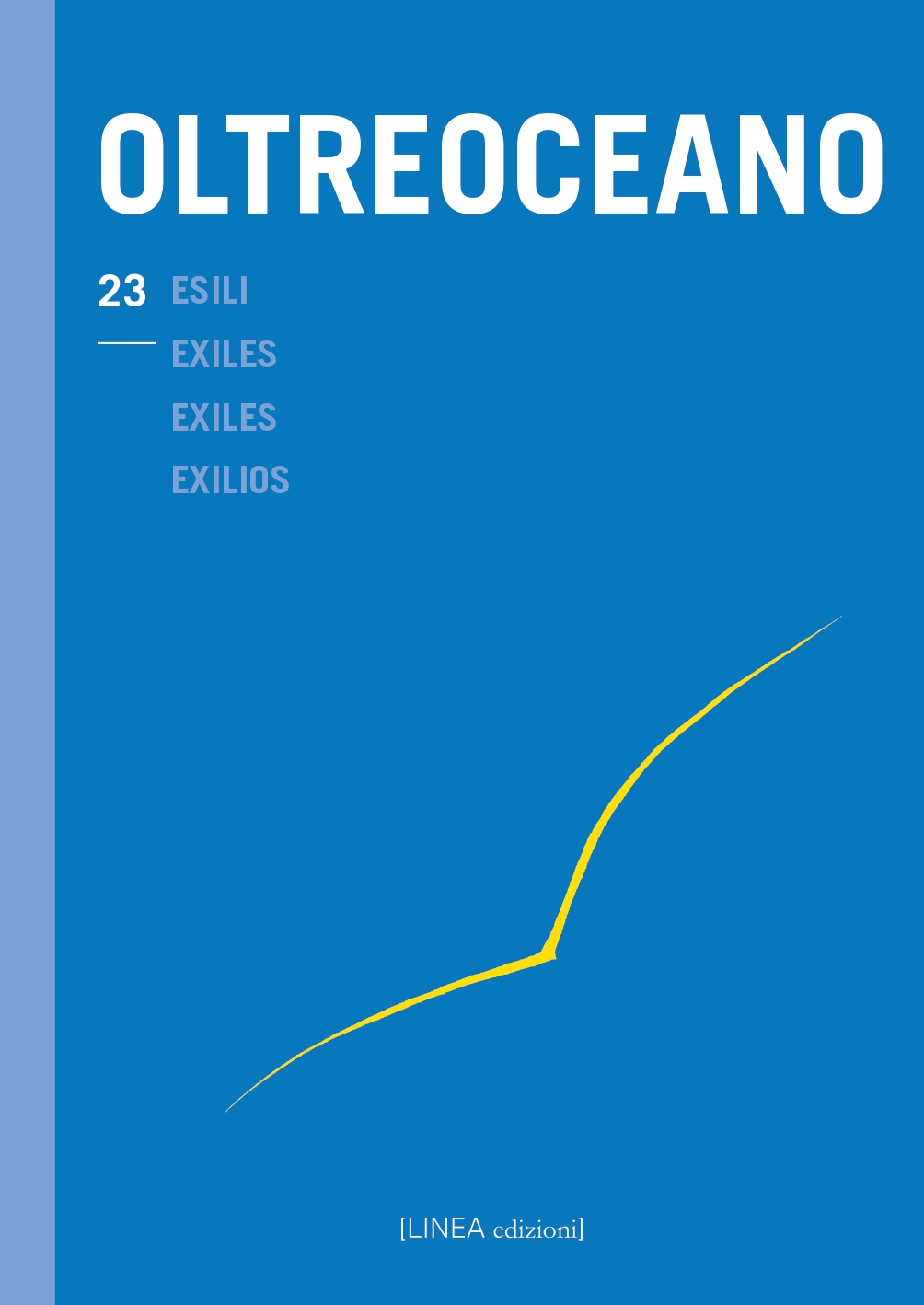Forms of Exile
DOI:
https://doi.org/10.53154/Oltreoceano94Keywords:
exile, insilio, dictatorshio, witness literature, Americas, EuropeAbstract
This number of Oltreoceano is dedicated to exile and considers its causes following the establishment of authoritarian and despotic regimes in Europe and in the Americas, where the outcasts arrived from both parts of the Atlantic and from within the same continent. All these elements can be seen in the literatures in English, French, Italian and Spanish analyzed herein. Exile is indeed an essential condition of literature and corresponds to a state of mind in which emotions derive from its intrinsic conditions, that is, from separation and breakage. After analyzing its different etymological nuances (which, according to the Treccani Encyclopedia, derive from political, economic and cultural reasons), the articles focus on the figure of the outcast and his / her relationship with XX- and XXI-century literature and writing mainly from a distance. If the politics of terror and coercion instigate its testimonial urge to witness the facts (the new outcast thus connects with the ancient form of exile of the Latin-American tradition), marginalization also produces its contrary, with the development of a literature of counter-exile. According to Claudio Guillén who coined the term in 1995, exilios and insilios converge in this literature since a different type of writing focused on exploring the new geographical setting allows exiled artists to find refuge in a world of fantasy where they are stimulated by the search for expressive freedom and the possibility to live without subduing to extreme influences. This inner exile does not necessarily require displacement from the homeland: rather than mere social and cultural categories, separation and reintegration are values to reject or adopt spontaneously. There are thus similarities between territorial exile and marginalization within one’s homeland.Downloads
References
Abellan, J. L. (1987): El exilio como categoría cultural:implicaciones filosóficas. Cuadernos americano, 1, pp. 23-30.
Adoum, J. E. (1974): El artista en la sociedad latinoamericana. In D. Bayón (Ed.), América Latina en sus artes (pp.207-237). México: Siglo XXI & Unesco.
Allende, I. (1981): La casa de los espíritus. Barcelona: Plaza &Yanes.
Allende, I. (1985): De amor y sombras. Barcelona: Plaza &Yanes.
Aragón Clavijo, U. de (1993): El caimán ante el espejo. Un ensayo de interpretacón de lo cubano. Miami: Universal.
Bobbio, N. (1978): Democrazia / Dittatura. In Enciclopedia Einaudi, Costituzione ‒ Divinazione, IV (pp.535-558). Torino: Einaudi.
Cortazar, J. (1974, 8 de dic): La responsabilidad del escritor latino-americano en exilio. La Opinión, p. 29.
Cortazar, J. (1980): América Latina: exilio y literatura. Madrid: Nueva Imagen.
Fernández, N. (2017): La dimensión desconocida. México: Random House.
Freud, S. (1971): Saggi sull’arte, la letteratura e il linguaggio. Torino: Einaudi.
Gil, J. (1980): Potere. In Enciclopedia Einaudi, opinione – Probabilità, X (pp. 996-1040). Torino: Einaudi.
Guillén, C. (1995): El sol de los desterrados: literatura y exilio. Barcelona: Quaderns Crema.
Guillen, C. (1976, Spring): On Literature of Exile and Counter-Exile. Books Abroad, 50, 2, pp. 271-280.
Kant, I. (1907): Critica del giudizio. Bari: Laterza.
Kohut, K. (1983): Escribir en París. Barcelona: Hogar del Libro.
Lavin, H. (1978): Literature and exile. N.Y.: Oxford press.
Lindholm Narváez, E. (2012): La cárcel simbólica escandinava. El exilio en la narrativa de Fernando Butazzoni, Carlos Liscano y Cristina Feijóo. In B. Caballero Rodríguez & L. López Fernández (Eds.), Bowron, T. (Ed. asistente), Exilio e identidad en el mundo hispanico: reflexiones y representaciones (pp. 986-1008). Biblioteca Virtual Cervantes.
L., S. (Longhi, Silvio) (1949): Esilio. In Enciclopedia Italiana, 1932, XIV (pp. 327-328). Roma: Istituto dell’Enciclopedia italiana fondata da Giovanni Treccani.
Padilla, H. (1981): En mi jardín pastan los héroes. Barcelona: Argos &Vergara.
Paoletti, M. (2020): Memorias de un renegado. Historias de la cárcel. Y del exilio. Y del desexilio. Bernal: Universidad Nacional de Quilmes. Recuperato da https://ediciones.unq.edu.ar/569-memorias-de-un-renegado.html (Ultima consultazione 13/11/2023).
Rasy, E. (2000): Le donne e la letteratura. Roma: Editori Riuniti.
Salas, H. (1980, octubre-diciembre): Julio Cortázar: la ubicuidad del exiliado. Cuadernos hispanoamericanos, 364-366, pp. 84-105.
Spinato, P. (2022 settembre): Recensione a Mario Paoletti, Memorias de un renegado. Historias de la cárcel. Y del exilio. Y del desexilio. Dal Mediterraneo agli oceani. Notiziario, 109, pp.14-15.
Downloads
Published
How to Cite
Issue
Section
License

This work is licensed under a Creative Commons Attribution-NonCommercial-ShareAlike 4.0 International License.
The authors undertake to comply with the following conditions, which are considered accepted at the time of submission of their contributions.
The sending of a text implies that it is unpublished and not submitted to be published elsewhere.
1. If accepted, the author shall confer on the publisher the right to publish and distribute it both in paper form and in the online electronic edition. The published articles will be downloadable and made available in open access.
2. Provided that it correctly indicates that the first publication took place in the journal Oltreoceano. Rivista sulle migrazioni the author has the right to: a) reproduce the article in separate extracts or collected in a volume; b) publish the article on their personal website or teaching site provided that these sites are of a non-commercial nature; c) deposit the article in online archives of a non-commercial nature, linked to the institution they belong to or as part of projects for the non-commercial dissemination and open access of scientific works.
The use of contributions by third parties, for commercial or otherwise unauthorized purposes, is not allowed. The publisher declines all responsibility for the unauthorized use of the material published in the journal.












